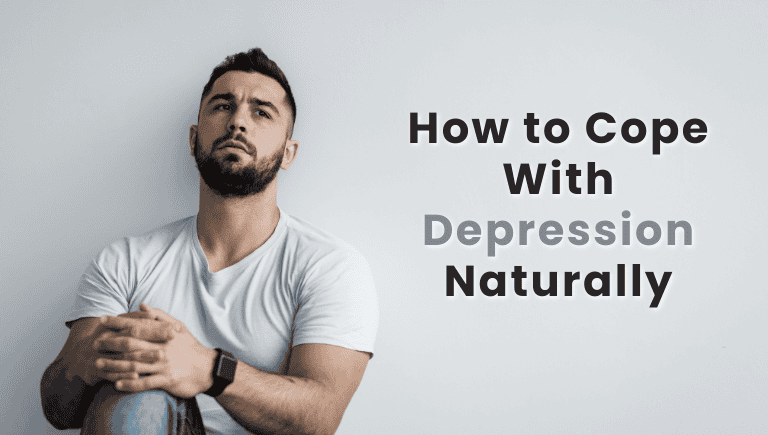How to Cope With Depression Naturally: People who suffer from depression often struggle with unhealthy emotions and thoughts. One way to help overcome them is by practicing a healthy lifestyle and talking with a mental health professional.
Attending a support group can be helpful. If you are unable to attend, consider getting together with friends or family regularly via phone, email, or social media.
Exercise
Exercise is one of the most effective antidepressants. It can help relieve symptoms of depression, improve sleep, and boost energy levels. It can also prevent mild depression from getting worse.

Don’t push yourself too hard — starting with something easy like walking around the block can help. Try to stick with an exercise routine until you feel better. Find an activity you enjoy so you’ll be more likely to keep it up.
Socializing, exercising with a friend, and volunteering are other great ways to get out of the house and meet people. Spending time with other people can lift your mood and help you regain a sense of purpose. Having a pet can also be helpful because they love you unconditionally.
Many herbs have been shown to help treat depression, but be cautious. Talk to your doctor about which ones may be right for you. They can tell you more about depression, how it affects your body, and what non-drug treatments might be appropriate for you. Remember, though, that you should always take depression seriously. It is a serious illness and can come with a risk of suicide.
Eat Right
The foods we eat are often linked to our mood, so eating right can be an important part of depression treatment. Some foods like leafy green vegetables, berries, tomatoes, and walnuts are rich in mood-boosting vitamins and minerals. Other foods such as cold water fish, eggs, and high-fiber whole grains may help boost levels of serotonin, a brain chemical that helps regulate emotions.
While it can be challenging to take care of yourself when you’re depressed, doing even the simplest things can make a big difference in how you feel. For example, it’s common for people to neglect basic hygiene, such as not showering or brushing their teeth, when they’re down.
Several herbs and supplements can act as natural antidepressants, but they’re not always safe or effective for everyone and they come with potential side effects. Talk to your doctor before trying any new supplements or other natural remedies for depression. They can help you determine whether they’re appropriate and safe for you. Also, never stop taking any prescribed medications without consulting your doctor.
Get Enough Sleep
Getting enough sleep is vital to combat depression, as a lack of restful sleep can contribute to mood swings and make it difficult to function. Improved sleep habits can help to alleviate depression and boost energy, focus, memory, and irritability.
Maintain a regular schedule, and go to bed at the same time each night. Avoid caffeine in the afternoon and evening, as it can interfere with your sleep. Exercise regularly, but not too close to bedtime, as it can stimulate your body and make it hard to fall asleep.
Try relaxation techniques before bed, like progressive muscle relaxation, deep breathing exercises, and meditation. These can also help to reduce stress, which often exacerbates depression.
Practice gratitude, which can lower stress levels and boost your mood. Even writing down a few things you’re thankful for daily can significantly affect your mood. Express yourself creatively, such as through art or music. Spend time with friends and family, especially face-to-face. Watch funny movies or TV shows. Practice mindfulness, which can help you take a break from the negative, self-critical thoughts that commonly accompany depression.
Spend Time With Other People
Depression can lead people to isolate and stop socializing, so it’s important to try to connect with friends and family. It may feel difficult to talk and even to go out at first, but it will improve over time. Try to spend a little time each day calling, texting, or talking in person, and try to attend activities that your friends are interested in doing. You’ll be glad you did!
You can also help someone you know cope with depression by reminding them that the feelings are temporary and will ebb and flow. Depression is a medical condition that affects millions of people, and it’s not something they should feel guilty about or judge themselves for.
If the depression is causing serious harm to their physical or emotional well-being, they must seek treatment from a healthcare provider, like a psychiatrist. The tips above can be used in conjunction with a treatment plan, speeding up recovery and preventing the depression from returning. Talk to a general practitioner about the depression and see what help is available.
Talk to a Psychiatrist
If you think you might be depressed, start by talking to your primary care doctor. Don’t be ashamed; depression is common, and your doctor will likely have a good idea about what to do next. If you feel comfortable, consider writing out your symptoms before your appointment to help guide the conversation.
During your initial visit, your physician will ask you about your symptoms and when they began, how long they’ve lasted, and how often they occur. They may also ask if they’ve impacted your daily life or your ability to work, study, or interact with family and friends.
Some psychiatrists will recommend a medication while others will suggest therapy or group counseling to address the root cause of your depression. Cognitive behavioral therapy, for example, helps you identify and change distorted or negative thought patterns. Interpersonal psychotherapy can help you work through relationship issues that contribute to your depression.
Reach out to loved ones who can provide support, and join a depression support group. You can even find online depression groups if you don’t feel like going out.
